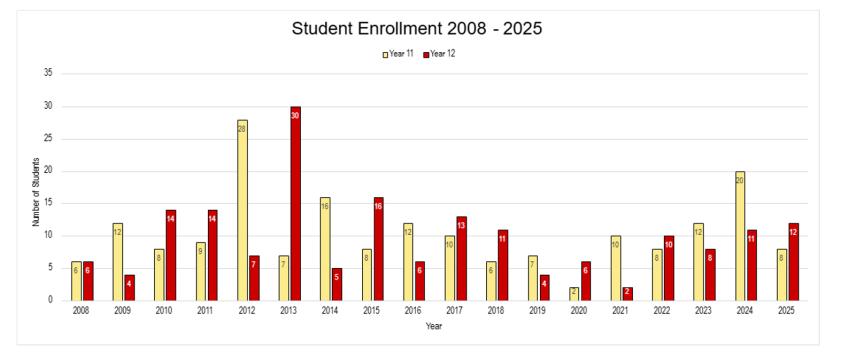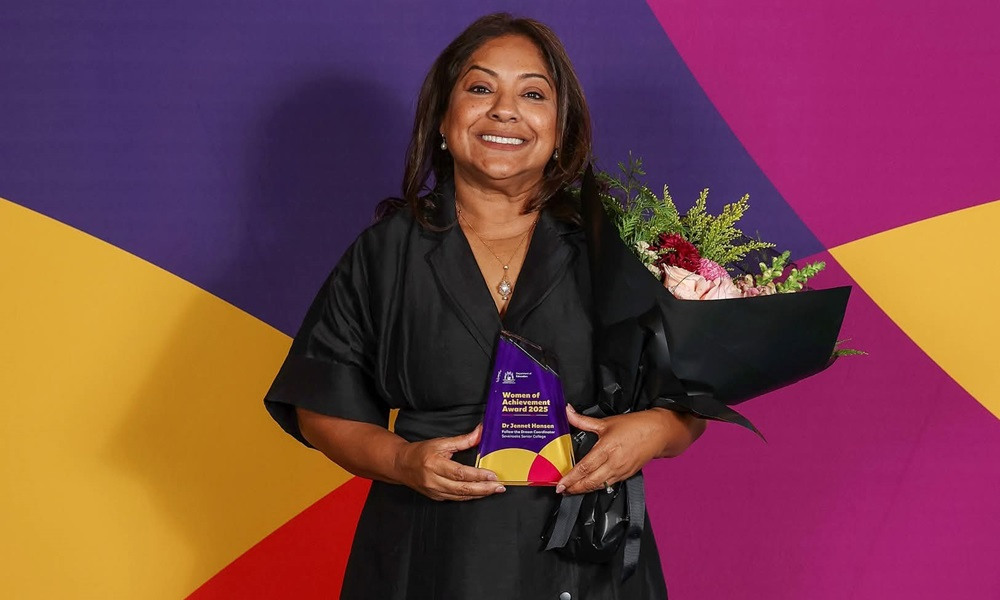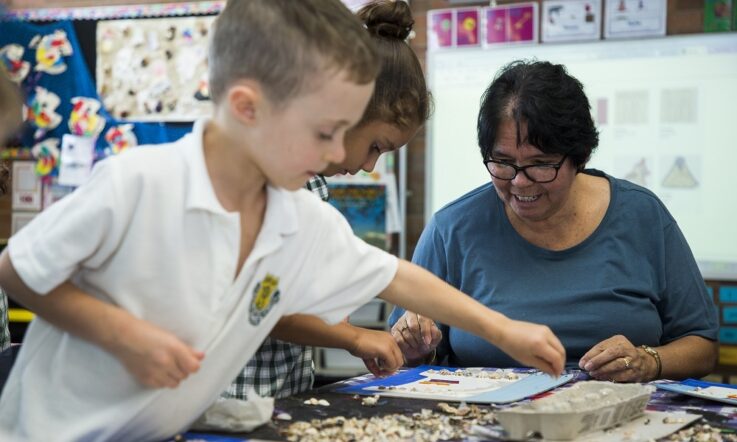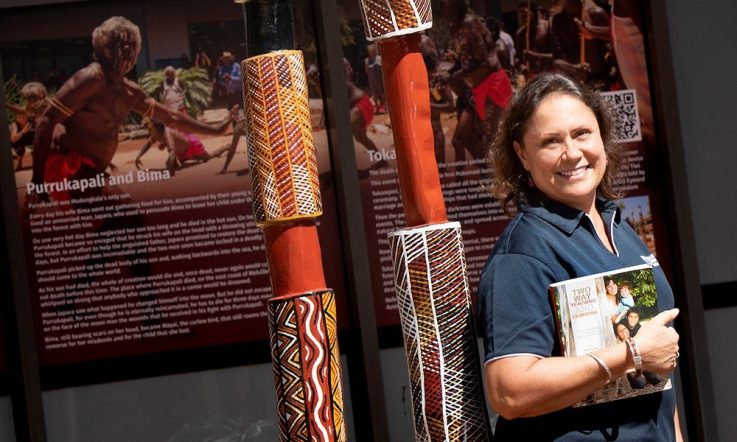‘While intergenerational trauma remains a reality, we are also seeing powerful examples of intergenerational success.’ Dr Jennet Hansen from Sevenoaks Senior College in Western Australia has dedicated 2 decades of her career to improving outcomes for Aboriginal students and their families. As the Coordinator of the Follow the Dream program at her school, she focuses on supporting students with their experiences at school, while strengthening cultural identity and engagement at the same time. The result? Aboriginal students in the program have gone on to thrive in a wide range of careers after graduation. In today’s article she shares more about the program, some of the initiatives they do to encourage students’ connections to their culture and Country, and the impact it has had on their learning, achievement and post-school pathways.
At Sevenoaks Senior College in Western Australia, year 11 and 12 students are offered flexibility as they map out their future in a young adult learning environment. Student timetables vary depending on their course choice, with a range of start and finishing times. In a population of 450 students, roughly 11% of students are Aboriginal.
As the Coordinator of the Follow the Dream program at Sevenoaks for the past 21 years, Dr Jennet Hansen works with Aboriginal students to prepare them for their post-school pathways into either university, TAFE, training or employment. Her efforts in this area were recognised earlier this year when she won the 2025 Director General’s Women of Achievement Award. It recognises exceptional female educators who contribute significantly to public education.
Born in South Africa and having grown up in the apartheid era, Hansen experienced racial discrimination and systemic inequality firsthand. She now uses that experience to relate to students’ own experiences of racial and cultural biases today. She also draws on the strength of her mother, who showed her the value of education.
‘I had a really strong mum that focused on education, and we just knew education was the way to get better opportunities,’ Hansen tells Teacher.
About the Follow the Dream program
The Follow the Dream program is a Polly Farmer Foundation initiative that supports the aspirations of Aboriginal students to successfully complete their schooling. Currently offered in 102 secondary schools across the country, it offers both educational and emotional support and encouragement to students through one-to-one tutoring, personalised learning plans, university goals, careers camps, internships and scholarships.
While Sevenoaks is her host site and the place she spends most of her time, Hansen also coordinates the Follow the Dream program at 6 other schools: Yule Brook College, Cannington Community College, Willetton Senior High, Rossmoyne Senior High, Canning Vale College and Thornlie Senior High. These schools have their own outreach champion that facilitates the program, but Hansen still is the overarching coordinator.
There are 80 students participating in the program across all 7 schools in 2025. The program is designed for aspirant students who meet specific selection criteria. ‘Students apply to join the program, so we have eligibility criteria that include good grades, consistent attendance, and a real desire to succeed at school,’ Hansen shares.
At Sevenoaks, students in Follow the Dream use their study zones to come to their dedicated learning space for support. ‘I see my students every day because of the model at our college,’ Hansen says. ‘As the coordinator, I oversee the hiring of tutors, design and review learning plans with students, track their WACE (Western Australian Certificate of Education) progress, and work out how we can give them the extra help they need.’
The program draws heavily on the expertise and wisdom of local Elders. ‘When I was appointed to start the program at Sevenoaks 21 years ago, I thought this is not about me doing things my way. Although I'm a person of colour, I'm not Aboriginal, so it was important to go back to the community and say, “what do you want out of this program for your children?”
‘We just had a grand opening of our yarning circle 2 weeks ago at the college. The Elders spoke about the school’s legacy and the changes they are seeing. The Elders have had their own children and now their grandchildren enrol at the College. The shift towards healing, strength, and lasting success across generations is changing the landscape in Aboriginal education making success the expectation, not the exception.’
Upon graduation, students also become part of the Follow the Dream alumni, there they have access to networking, scholarships and job opportunities as well.
Working with local Elders
Hansen aims to improve student attendance by having her room be a safe space for them to come. It’s equipped with a microwave and a fridge, and stocked with food for students to eat, to make it feel like a home away from home for them.
She explains she also tries to make the lessons really engaging for students and encourage them to select subjects they would typically steer away from, like science.
‘As part of my PhD project, I organised a program where Elders came to speak to students about Aboriginal science, demonstrating that Aboriginal people were the first scientists. We explored scientific concepts of friction through fire, flight through the boomerang, and sound through the didgeridoo,’ she shares.
Hansen says that while some students have difficulty engaging with science in a traditional classroom, she noticed a huge increase in their participation in science lessons delivered by their Elders. ‘With a science teacher I'd watch them being distracted in class. Yet when we had Aboriginal people come in to do the lessons, it was totally different.’
Students have also been engaged in learning on Country, exploring the local ecosystems of the Djarlgarro Beelier (Canning River).
‘Elders come in to share stories about this place and how it was shaped by the spiritual ancestor of the Noongar, the Waugal, and how Noongar people lived along the river, drawing food from its waters and finding shelter in the wetlands. From these stories, students have created art pieces and designed a college NAIDOC polo that reflects the river, its native wildlife, and this living history. These creations have also shaped the heart of our college, our yarning circle,’ Hansen says.
‘Learning on Country is deeply powerful. Every time we take our students there, they tell us it’s far richer and more meaningful than sitting in a classroom.’
Improved outcomes for students
Hansen says she proudly has a wall of photos in her room that displays every student who has participated in the program all the way back to the first cohort in 2004.
‘They started as kids and now they have their own children, and I get to meet their kids and they say, “you’re still here, Jennet?” And I say, “yes, I'm still here”,’ she laughs.
Hansen says they also track data on students’ performance at school as this allows them to celebrate achievements, address challenges early, and give students the best chance to succeed. When the program started in 2004 there were only a handful of students completing year 12. Since then, there has been a steady increase, with enrolment peaking in 2013 when 30 students graduated with a WACE.

‘Although enrolment numbers vary each year, we consistently graduate students who contribute to impacting the Closing the Gap targets,’ Hansen adds.
Student voice further reinforces the improved outcomes for students.
Follow the Dream has had a major role in guiding me towards my future. From Jennet to guest speakers and receiving academic support from tutors, it has transformed the way I approach learning. Additionally, the program fosters an inclusive environment where all Aboriginal students feel valued, supported, and empowered to succeed. (Year 12, General)
Follow The Dream not only helped me gain entry into university to pursue a degree I was truly passionate about but also provided unwavering guidance and encouragement from both staff and students every step of the way. In the end, the only real barrier to achieving greatness is yourself and the choices you make along the way. (Year 12, Nursing)
I really passed this year because of the support I got from Follow the Dream. I was facing huge challenges with transport and getting to school as I live in Joondalup but with help from Jennet and the tutors, I successfully gained my WACE. I learnt to never give up and it’s worth it in the end. (Year 12, Follow the Dream)
Hansen believes the key is role modelling what success looks like, building students’ confidence, and believing in them.
‘It's the little things that we do that can make such a difference to a child's life. It has worked for us here at the college and in my program. We've got amazing students and alumni – from a principal Cyber Security Identity at Rio Tinto, to a mining engineer at Genesis Minerals, to Aboriginal health practitioners, AIEOS (Aboriginal and Islander Education Officers), Business Owners, choreographers and directors, dancers, singers, FIFO workers, tradespeople and more,’ she says.
‘They are building stable, fulfilling lives, buying their own first home, owning vehicles, and experiencing the world through international travel.
‘It is deeply rewarding to see them walking their own path, reconnecting with culture, embracing opportunity, and stepping into their future with pride and purpose. It gives me a quiet sense of peace, knowing I’ve played a small part in that journey.’



